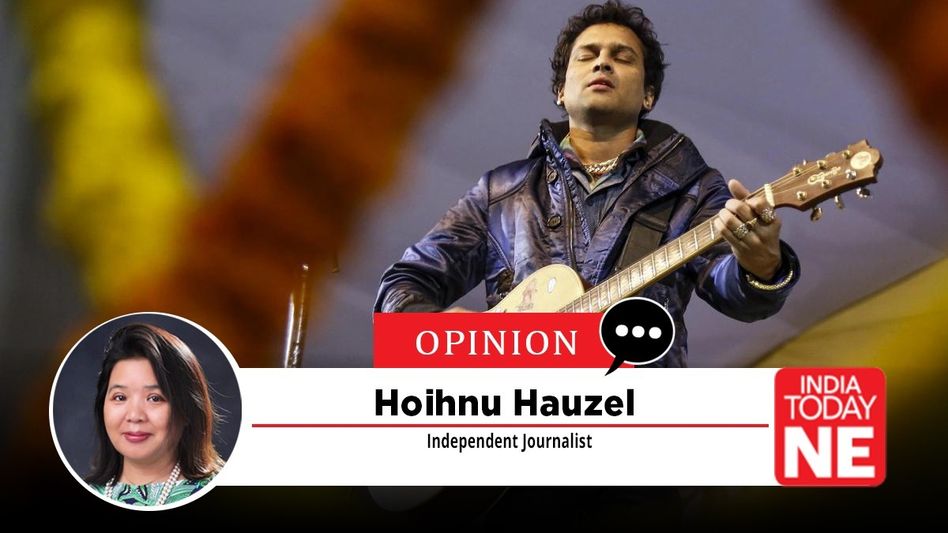Zubeen Garg: The Song That Stayed Home
Any idea what it feels like when home calls louder than fame? Zubeen Garg lived that feeling every single day of his life. At just 19, he arrived with his maiden album Anamika, a soulful Assamese album released in 1992 that didn’t just make waves; it became the voice of a generation.

Any idea what it feels like when home calls louder than fame?
Zubeen Garg lived that feeling every single day of his life. At just 19, he arrived with his maiden album Anamika, a soulful Assamese album released in 1992 that didn’t just make waves; it became the voice of a generation. In Assam, he was already a star before the rest of the country even heard his name. In the process, he brought Assamese music into every home: young or old, everyone found themselves humming his songs.
Over the years, he would go on to record nearly 40,000 songs in almost 40 languages which is a staggering output by any measure. Yet his heart never strayed from home.
To understand Zubeen Garg, one must understand the land or the soil beneath his feet. Assam, or the Northeast as a region, is where music was never just melody. In many ways, it was a form of resistance. Or, a refuge in so many ways given the fractured history of the land.
Assam’s political history is tangled with movements, especially the Assam Agitation of the late 1970s and early ’80s led largely by students who rose up to protect their identity, land, and language. It wasn’t just a political fight. It was a cultural awakening. That’s the time when songs became slogans. Musicians became messengers.
From Bhupen Hazarika to emerging grassroots voices, the microphone became a weapon, often mightier than any speech.
Zubeen inherited that legacy against the backdrop of a fractured state but he didn’t just carry it forward; he amplified it, widened its reach, and deepened its meaning.
Also Read: Nepal burns, but are we listening? A cautionary mirror for Northeast India
Music as the Mirror of Assam’s Soul
The music of Assam is not merely an aesthetic experience; it is a sophisticated repository of cultural consciousness, some would say, a living archive where history, mythology, ritual, and emotion merge. It resists reduction to melody and rhythm alone; rather, it functions as a vital mode of cultural narration, encoding centuries of collective memory, social struggle, and regional identity.
Rooted in a plurality of folk idioms be it the seasonal exuberance of Bihu, to the mystic intonations of Baul, to tribal and indigenous forms Assamese music has continually evolved, absorbing modern forms without ever relinquishing its foundational intimacy with the land.
As of today, this tradition remains vibrantly alive. A new generation of vocalists, composers, and experimentalists continues to expand its boundaries, all the while carrying forward a legacy that is as much political as it is artistic. Yet within this dense and diverse sonic landscape, one figure towers above the rest – it is but Zubeen Garg.
To measure Zubeen’s legacy by his discography alone that is by the nearly 40,000 songs he recorded in close to 40 languages, would be a disservice. His true significance lies in his extraordinary capacity to serve as a conduit for the emotional, social, and political consciousness of Assam. He was not merely a singer, but a public voice, capable of articulating the intimate interiority of the individual alongside the broader anxieties of a region historically marked by unrest, marginalization, and unresolved identity politics.
The Northeast and, Assam, in particular has long occupied an ambivalent space in the Indian national imagination: geographically distant, politically fraught, and culturally underrepresented. For decades, it has turned to music not just for joy, but for solace, protest, and articulation. Music here has functioned as both refuge and resistance, and Zubeen emerged as a rare artist who could embody both these registers.
What made Zubeen singular was not just his talent, but his moral clarity and deep empathy — his instinctive alignment with the people over power, with authenticity over artifice. He sang not only of love and loss, but of disillusionment, systemic rot, and the dream of a more just society. He was able to channel unspoken rage without turning cynical, to express vulnerability without losing strength. This delicate balancing act made him a figure of profound emotional and political trust.
In this sense, Zubeen did not merely entertain he represented. He redefined the Assamese musician not as a distant icon, but as a cultural interlocutor, a custodian of memory, and a beacon of shared truth.
He didn’t just sing of love. He voiced outrage. He cried out grief. He questioned power.
His songs were not merely compositions; they were acts of bearing witness. They carried the weight of his people’s pain and their fragile, stubborn hopes.
Zubeen Garg didn’t need Bollywood to become a star. By the time Ya Ali from Gangster (2006) swept across the nation, he was already an icon in Assam and the wider Northeast. The song may haveintroduced his voice to a broader, pan-Indian audience, but for millions back home, he had long been a cultural force prolific, unpredictable, and deeply personal.
Ya Ali was not a launchpad. It was an inflection point. The trademar of his voice is its haunting rawness, unmistakable freshness that ultimately found its way into every corner of the country: embedded in ringtones, blasting from loudspeakers, reverberating through car windows. For many artists, that kind of national attention would have been the cue to relocate, to shift base, to “arrive” in the conventional sense.
But Zubeen stayed exactly where he was.
“I live like a king,” he once told a reporter with a disarming smile. “And a king should never leave his kingdom.”
It wasn’t arrogance. It was clarity. A refusal to trade authenticity for access.
He clearly never romanticises the cultural circuits he couldn’t relate to. In fact, he actively resisted them. “Mumbai has too much attitude,” he said bluntly. “That’s why I won’t come. I don’t have that kind of attitude.”
Zubeen has always known that the real power of music lies not in how far it travels, but in how deeply it connects. And deep connection requires proximity: to one’s people, one’s land, one’s language to the soil and river that shaped the song.
Nowhere is that intimacy clearer than in his own vision of the end. “When I die,” he once said, “lay me in the Brahmaputra, and let Mayabini play.” The mighty river, often called the lifeline of Assam, isn’t just a geographic marker in his life, as it turned out, it is a spiritual one.
In staying rooted, Zubeen didn’t just reject the mainstream. He created his own one with a different centre of gravity. And one that is often measured by resonance. Today, the internet is flooded with voices — Assamese and Northeastern alike — each sharing how his songs marked a moment in their lives. Zubeen doesn’t just have fans; he has a story in everyone’s memory.
A Star With No Distance
Zubeen Garg was never the typical celebrity even though he was greater than one. He was something far rarer a human one. His fame didn’t come with security cordons, or the aloofness that often insulates icons from the people who love them. In fact, Zubeen spent most of his life doing the opposite of what celebrity culture teaches: he closed the gap. He kept himself radically accessible and, in doing so, redefined what it means to be a public figure.
There’s now a widely shared story of a young musician who narrated how he met Zubeen in a parking lot. They exchanged a few words and then one hour passed. Zubeen had invited him to his studio the next day and even followed up with a text to make sure he came. That was Zubeen.
Another fan posted that even a 30-minute drive could take him over an hour because he’d stop to speak with people. To listen. To offer help. And when people came with problems be it medical, financial, emotional he responded not with platitudes, but with action. It could be a child’s surgery; A widow’s rent; a student’s tuition. He would do all with a deep intent and no PR stunts ever followed what he did for people.
During the COVID-19 lockdown, when others shut their doors, Zubeen opened his home. It became a shelter for the stranded, the forgotten, the voiceless. And again, compassion for him is, as many say, a second nature. It was an inborn ethic.
Perhaps, in never demanding the spotlight, in refusing to act like a ‘typical’ star, Zubeen was taken for granted by the very institutions that should have honoured him most. He wasn’t one to lobby for awards. He never chased validation. He was already a national treasure even if the nation didn’t always pause to recognise it.
The Purity of His Soul
Beneath the noise of celebrity and the rituals of fame, Zubeen remained startlingly uncorrupted. Those who know him closely say that he was guided by a moral clarity that felt almost defiant in an age of public ambiguity. Where most artists learned to navigate power by compromise, Zubeen refused dilution. He didn’t just write protest songs; he lived them. There’s a telling moment from an interview where a reporter asked him how long he would take to fix a sprawling civic mess.
“One day,” Zubeen said.
The reporter laughed. “How?”
“I’ll suspend everyone,” he replied, deadpan.
Unlike many public figures, he didn’t obscure his privilege rather he confronted it. He renounced his Savarna identity and called himself simply a “human artist.” He showed up to protests not as a guest of honour like anyone in his shoes would do. But he would be a part of it as a comrade. He walked among the people with them, beside them. His politics were not a posture but practice. And his music, too, bore that urgency. One of his protest songs declared: “A blind rule, corrupt rulers, in the naked pursuit of riches —Those who decide the dreams of life and death lie sleeping in the arms of luxury.”
An unusual farewell
His greatness was not measured in awards or headlines, but in the silence that followed his final song. In Guwahati, when his body lay in state at the Sarusajai Stadium for three days, over a million people came to say goodbye. The sheer scale of it placed him in a rare and sacred lineage of public mourning not unlike Gandhi, Mandela, or Jayalalithaa.
The air pulsed with Mayabini Ratir Bukut. Tree branches bowed under the weight of mourners. Rooftops, balconies, traffic poles all became makeshift viewing platforms for those who could not fit into the street that was already loaded with oceans of people. And as night fell, phone flashlights swayed gently in the dark for solidarity. It looked like a field of stars had descended, refusing to let go.
As one person wrote online: “Why are calves, horses, dogs joining humans to cry for a man?”
I never met him, but I now know that he was one of the greatest souls to ever walk this land.
After Zubeen, Bihu will never sound the same.
The Brahmaputra will flow a little heavier now.
And the Northeast so often fragmented and unheard has lost its strongest bridge.
And yet, even in his passing away, he has that power to cement those whom he left behind.
Copyright©2026 Living Media India Limited. For reprint rights: Syndications Today









